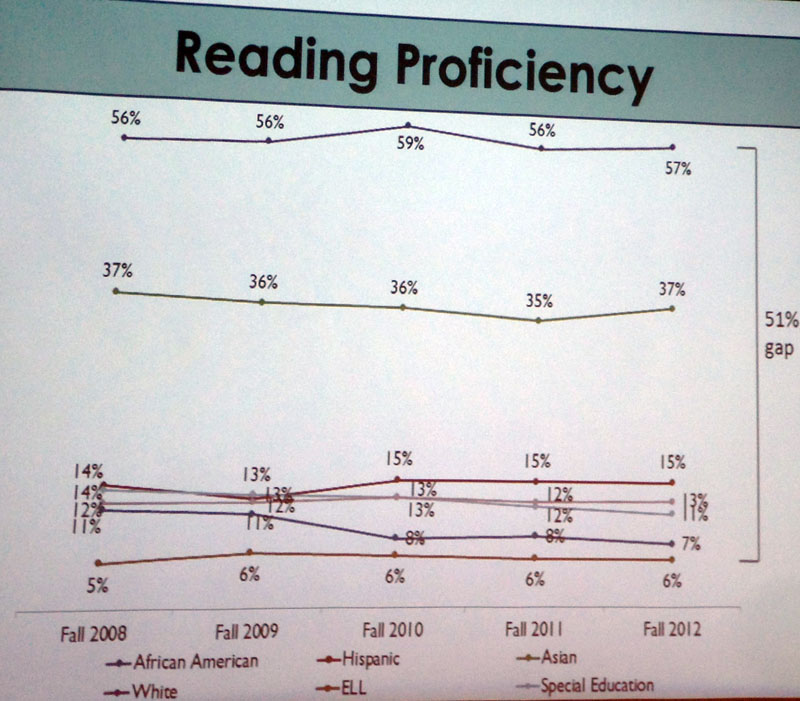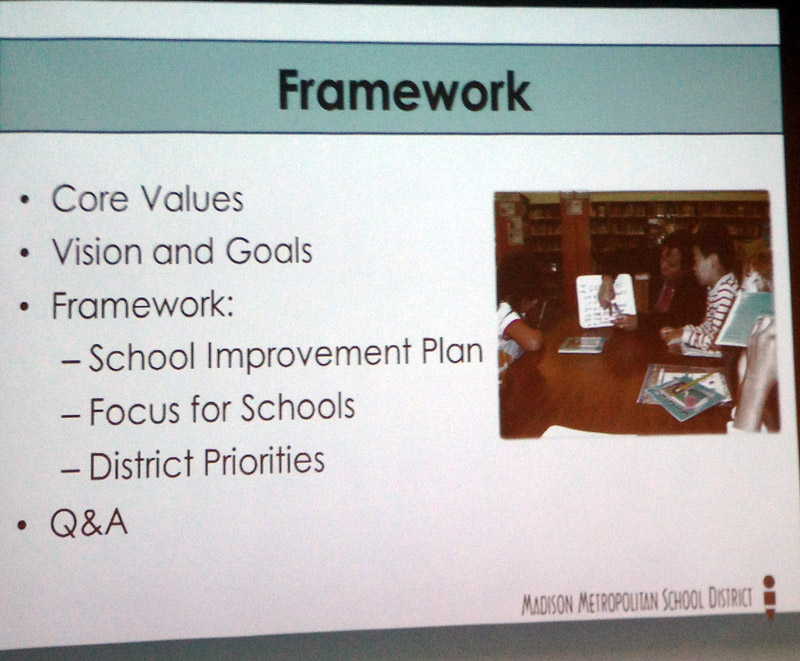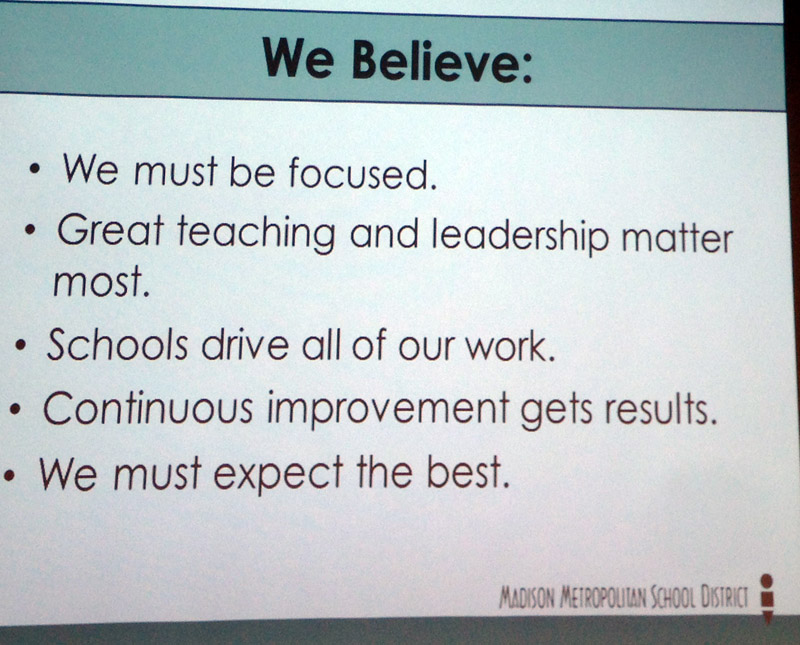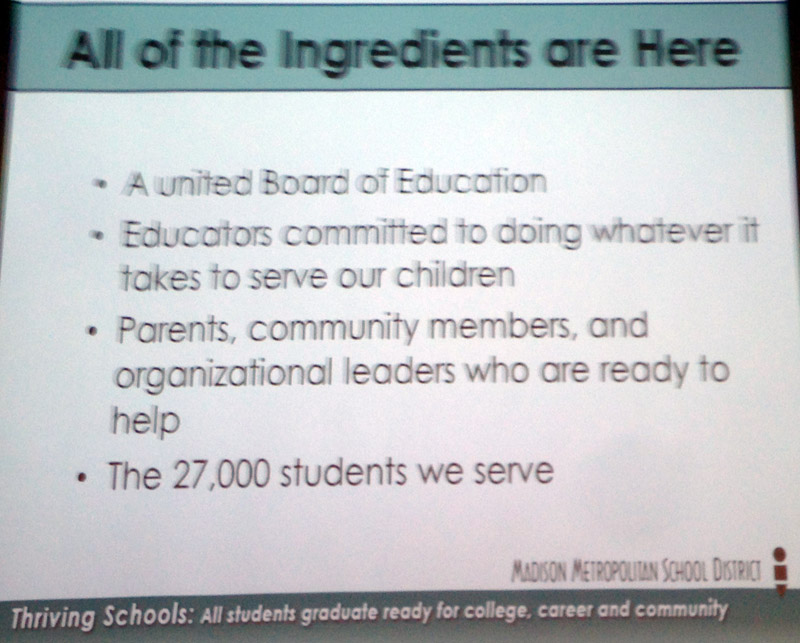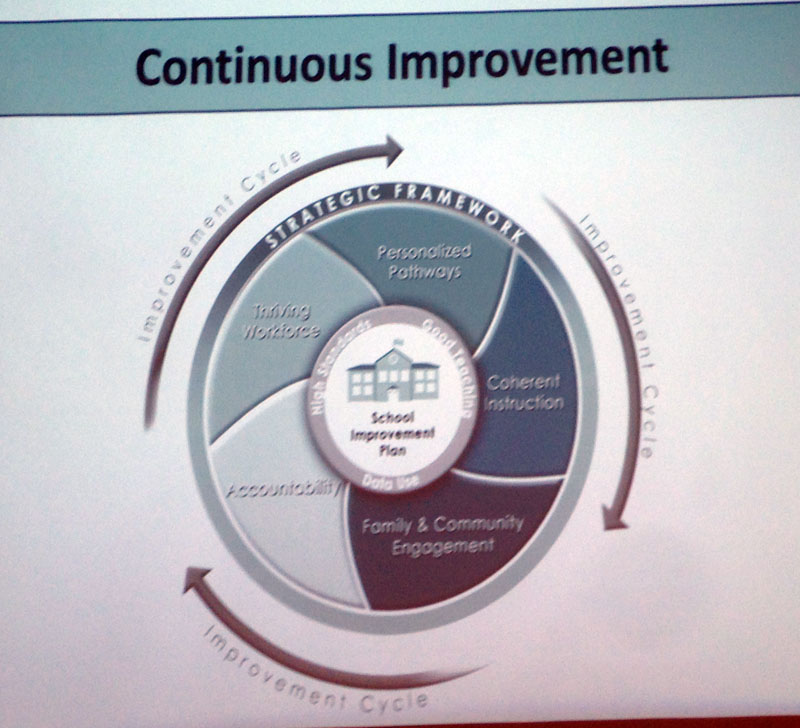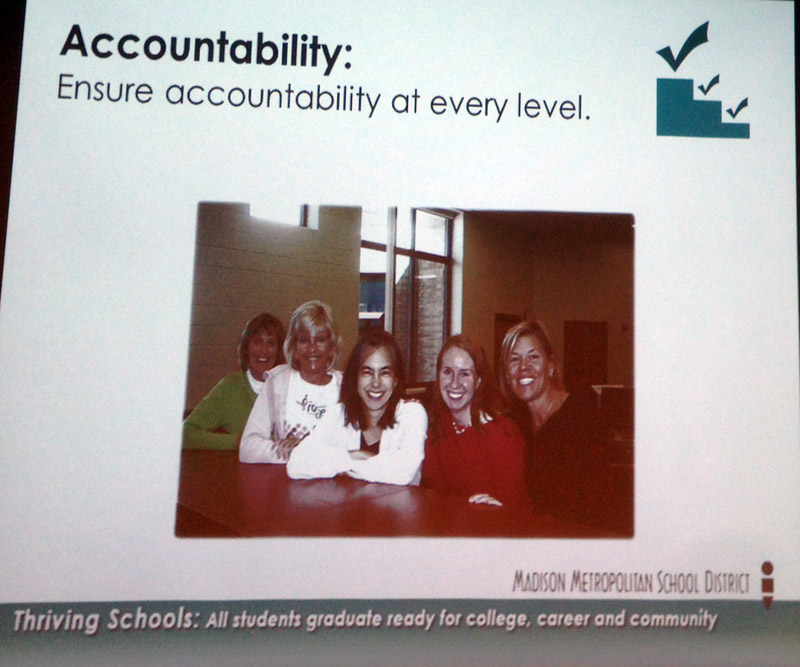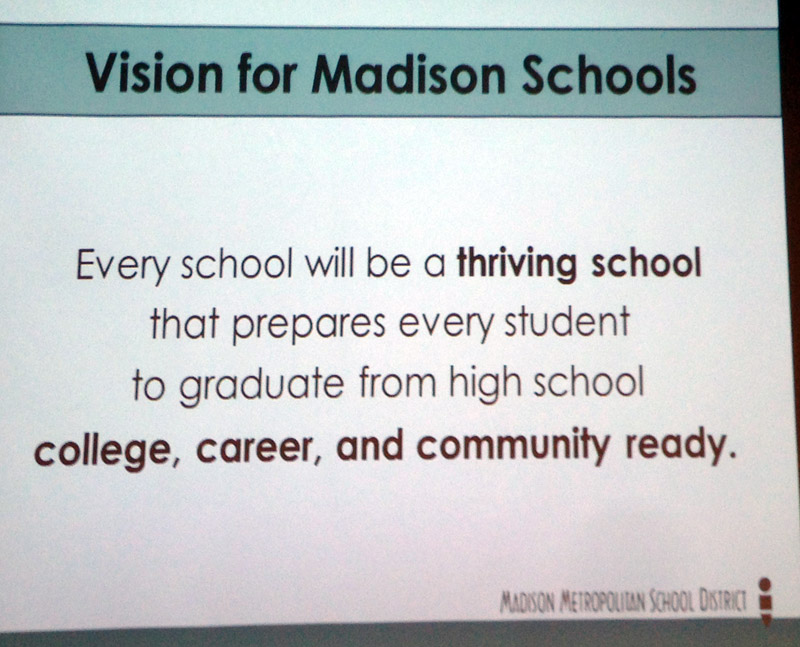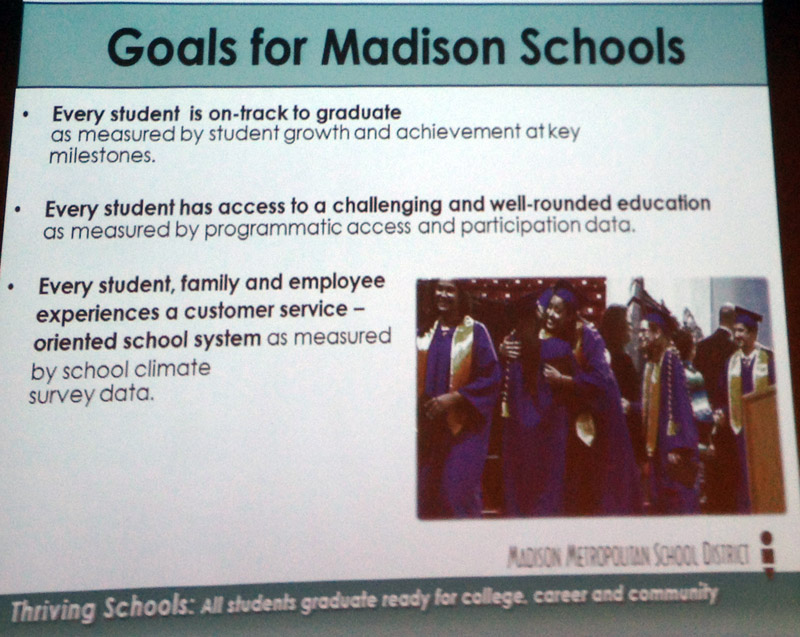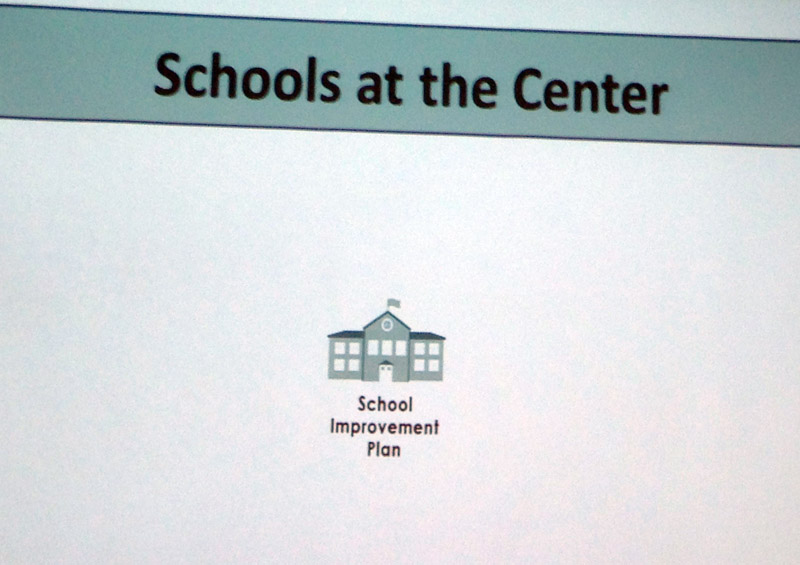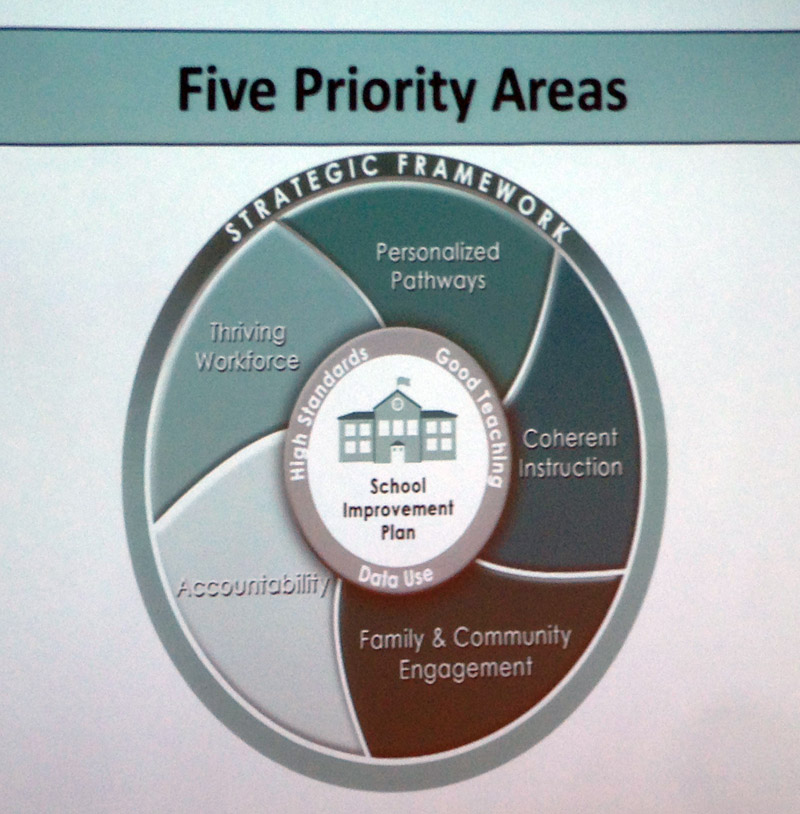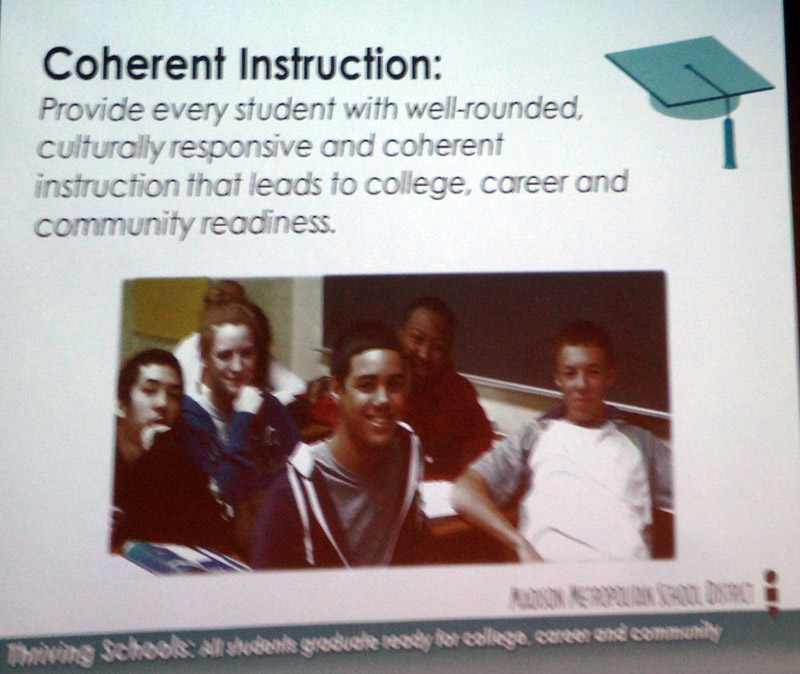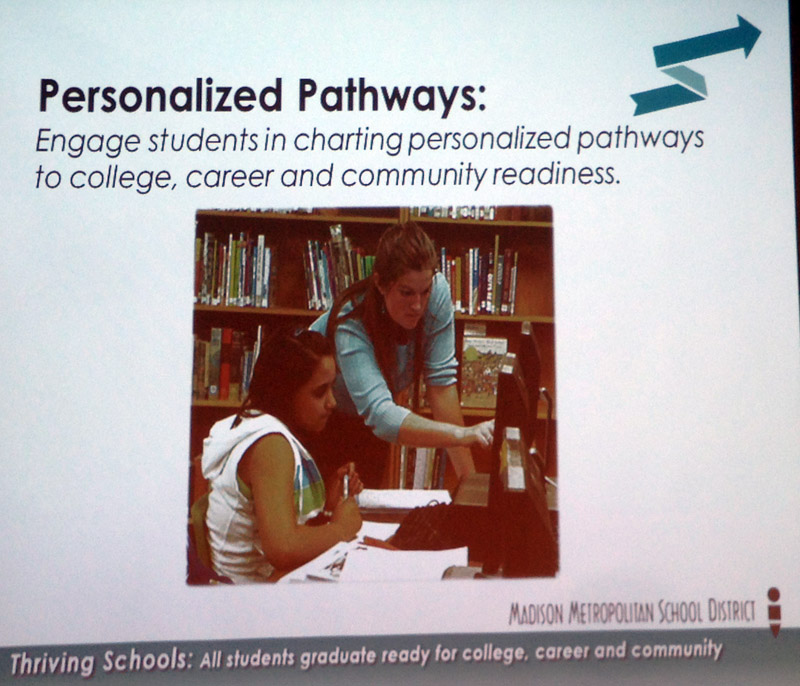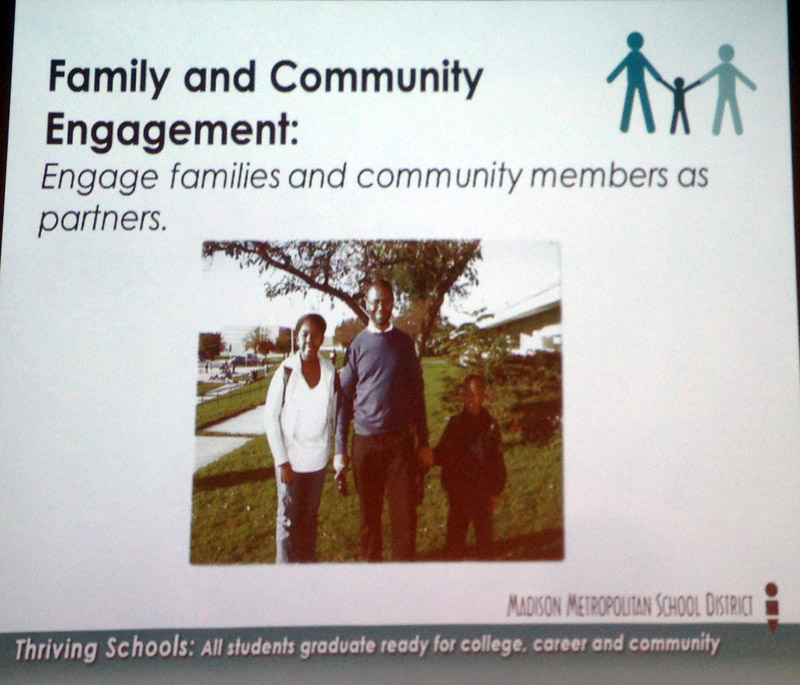Search Results for: Cheatham Madison rotary
Madison’s Taxpayer Supported K-12 School Superintendent Cheatham’s 2019 Rotary Talk
2013: What will be different, this time? Incoming Superintendent Jennifer Cheatham’s Madison Rotary Talk. December, 2018: “The data clearly indicate that being able to read is not a requirement for graduation at (Madison) East, especially if you are black or Hispanic” 2005: When all third graders read at grade level or beyond by the end […]
Madison Superintendent Cheatham’s Rotary Club Talk (audio & slides): “What will be different this time?”
15mb mp3 audio.
Superintendent Cheatham’s slides follow (4MB PDF version). I hope that the prominence of Madison’s disastrous reading scores – slide 1 – indicates that this is job one for our $15,000ish/student organization.
A few of the Superintendent’s words merit a bit of analysis:
1. “What will be different this time?” That rhetoric is appropriate for our Madison schools. I compiled a number of notes and links on this subject, here.
2. “Ready to partner with local businesses and other organizations”. Great idea. The substance of this would certainly be a change after the Madison Preparatory Academy IB Charter school debacle (Urban League) and, some years ago, the rejection of Promega’s kind offer to partner on Madison Middle Schools 2000.
3. Mentions “all Madison schools are diverse”. I don’t buy that. The range of student climate across all schools is significant, from Van Hise and Franklin to LakeView, Mendota and Sandburg. Madison school data by income summary. I have long been astonished that this wide variation continues. Note that Madison’s reading problems are not limited to African-American students.
4. Mentioned Long Beach and Boston as urban districts that have narrowed the achievement gap. Both districts offer a variety of school governance models, which is quite different than Madison’s long-time “one size fits all approach”.
5. Dave Baskerville (www.wisconsin2.org) asked a question about benchmarking Madison students vs. the world, rather than Green Bay and Milwaukee. Superintendent Cheatham responded positively to that inquiry. Interestingly, the Long Beach schools prominently display their status as a “top 5 school system worldwide”.
6. “Some teachers and principals have not been reviewed for as long as 7 years”. This points to the crux of hard decision making. Presumably, we are at this point because such reviews make no difference given rolling administrator contracts and a strong union umbrella (or floor depending on your point of view). Thus, my last point (below) about getting on with the hard decisions which focus the organization on job number one: reading.
Pat Schneider and Matthew DeFour summarize the Superintendent’s press release and appearance.
Finally, I found it a bit curious that the Superintendent is supporting spending (and related property tax growth) for current programs in light of the larger strategy discussed today along with the recent “expert review”. The review stated that the “Madison School District has resources to close achievement gap”
This would be a great time to eliminate some programs such as the partially implemented Infinite Campus system.
Superintendent Cheatham’s plan indicates that choices will be made so that staff and resources can focus on where they are most needed. I wholeheartedly agree. There is no point in waiting and wasting more time and money. Delay will only increase the cost of her “strategy tax“.
“36 people” on madison’s 2020 superinteNdent search
Logan Wroge: “The challenges of the district are actually not completely known because of a lack of transparency in how the district is doing with respect to several critical and urgent matters,” Chan Stroman, a West Side resident and education advocate said, adding she wants to see honesty and competence in the next leader of […]
Jennifer Cheatham’s Harvard Lecturer Position
Harvard Graduate School of Education: Jennifer Cheatham, Ed.M.’06, Ed.D.’10, will be joining the HGSE faculty as a senior lecturer on education and director of the Public Education Leadership Program (PELP). She was previously superintendent of the Madison (Wisconsin) Metropolitan School District, a post she had held since 2013. Prior to that role, she had worked […]
Madison School Board eyes hiring consultant in superintendent search
Logan Wroge: In 2012, the School Board hired consultant Ray and Associates, of Cedar Rapids, Iowa, for $31,000 to assist in the search process to replace former Superintendent Dan Nerad. But questions around a finalist’s background left some board members at the time saying they were not fully aware of controversial issues. That finalist withdrew […]
2013: What will be different, this time? 2019: Jennifer Cheatham and the Madison Experience
Paul Fanlund, in an interesting contrast to recent Isthmus articles: She said Madison should look beyond simple metrics and keep working to “create a liberating experience for students where they’re valued, where they’re seen as fully human and complex. That’s what this community needs to hold at the center as it’s making its decisions in […]
A rotten year Madison: teachers report from the classroom (2013 – “what will be different, this time?”)
Dylan Brogan: But the transfrmation has been a rocky one and disparities persist. Isthmus collected over 30 hours of interviews with dozens of Madison educators over the past two months. Teachers from three elementary schools, five middle schools and three high schools shared their experiences in the classroom. Most requested anonymity because of fears of […]
Jennifer Cheatham resigning as Madison school superintendent
Dylan Brogan: Jennifer Cheatham is expected to resign as superintendent of the Madison school district at a news conference Wednesday. Isthmus confirmed the news with three members of the Madison school board and other sources. It is not known when Cheatham, who has led the district since 2013, will step down. Rachel Strauch-Nelson, district spokesperson, […]
Commentary on Madison’s Taxpayer Supported K-12 School Discipline and Achievement Climate
Kaleem Caire: Our School District has an obligation to learn from these incidents and to ensure that our staff, students and parents have clear guidelines about how to address similar situations when they arise, and how they can also avoid such challenges as well. After reading the police reports, it is clear to me that […]
Adult employment and the Madison School Board’s self interest
Chris Rickert: Like the rest of the board, both also voted to approve the 304-page employee handbook that replaced union contracts beginning in summer 2016. District legal counsel Dylan Pauly pointed to two board policies that include provisions related to managing conflicts of interest among board members. One says board members should “avoid conflicts of […]
2017 Madison School Board Candidate Forum Video
Part 1 Part 2 Part 3 Part 4 Much more on the candidates, here: Seat 6 and Seat 7. Nostalgic visitors might find past school board election links and videos of interest. I’m glad that we’re blessed with choice. I’m also glad that several candidates mentioned our abundance of resources (we spend far more than […]
Let’s Compare: Boston, Long Beach & Madison
Enrollment Staff Budget Boston 56,650 9,125 $1,153,000,000 ($20,353/student) Long Beach 78,230 6,515 $1,133,478,905 ($14,489/student) Madison 25,231 4,081 ? $421M + “Construction” and ? (at least $17k/student) SIS: In 2013, Madison Superintendent Jennifer Cheatham said “What will be different, this time“? The Superintendent further cited Long Beach and Boston as beacons in her Rotary speech. However, […]
Madison Adds Another Program: Community Schools
Doug Erickson: Madison has so many organizations that want to do good for the community and that offer programming; the problem is that the coordination is really hard,” Sloan said. “That will be the real benefit of this: coordination that’s focused and centralized.” Mendota Principal Carlettra Stanford said the school currently does not offer programming […]
Madison’s Schwerpunkt: Government School District Power Play: The New Handbook Process is worth a look
Wisconsin’s stürm and drang over “Act 10” is somewhat manifested in Madison. Madison’s government schools are the only Wisconsin District, via extensive litigation, to still have a collective bargaining agreement with a teacher union, in this case, Madison Teachers, Inc. The Madison School Board and Administration are working with the local teachers union on a […]
Madison’s Staffing Compared to Long Beach & Boston
In 2013, Madison Superintendent Jennifer Cheatham said “What will be different, this time“? The Superintendent further cited Long Beach and Boston as beacons in her Rotary speech. However, based on recently released 2015-2016 budget slides (PDF) and Molly Beck’s summary, it appears that the same service, status quo governance model continues, unabated. A focus on […]
Election Grist: Madison Teachers Inc. has been a bad corporate citizen for too long
David Blaska: Teachers are some of our most dedicated public servants. Many inspiring educators have changed lives for the better in Madison’s public schools. But their union is a horror. Madison Teachers Inc. has been a bad corporate citizen for decades. Selfish, arrogant, and bullying, it has fostered an angry, us-versus-them hostility toward parents, taxpayers, […]
Madison “Strategic Framework Process” Update; a few tweets
Supt. Cheatam on 1st year of new school improvement effort: Schools moving away from wanting to be complaint, to adapting for their students — Molly Beck (@MollyBeckWSJ) June 28, 2014 "You don’t get to opt out of doing what works in schools, but there are lots of ways that can look (for each school)." — […]
Madison Schools’ 2014-2015 $402,464,374 Budget Document (April, 2014 version)
The Madison School District (3MB PDF): Five Priority Areas (just like the “Big 10”) but who is counting! – page 6: – Common Core – Behavior Education Plan – Recruitment and hiring – New educator induction – Educator Effectiveness – Student, parent and staff surveys – Technology plan 2014-2015 “budget package” 3MB PDF features some […]
Comments & Links on Madison’s Latest Teacher Union Agreement
Under the new contracts clerical and technical employees will be able to work 40-hour work weeks compared to the current 38.75, and based on the recommendation of principals, employees who serve on school-based leadership teams will be paid $20 per hour.
Additionally, six joint committees will be created to give employees a say in workplace issues and address topics such as planning time, professional collaboration and the design of parent-teacher conferences.
Kerry Motoviloff, a district instructional resource teacher and MTI member, spoke at the beginning of the meeting thanking School Board members for their collective bargaining and work in creating the committees that are “getting the right people at the right table to do the right work.”
Cheatham described the negotiations with the union as “both respectful and enormously productive,” adding that based on conversations with district employees the contract negotiations “accomplished the goal they set out to accomplish.”“Madison is in the minority. Very few teachers are still under contract,” said Christina Brey, spokeswoman for the Wisconsin Education Association Council. Fewer than 10 of 424 school districts in the state have labor contracts with teachers for the current school year, she said Wednesday.
And while Brey said WEAC’s significance is not undermined by the slashed number of teacher contracts, at least one state legislator believes the state teacher’s union is much less effective as a resource than it once was.
Many school districts in the state extended teacher contracts through the 2011-2012 school year after Act 10, Gov. Scott Walker’s law gutting collective bargaining powers of most public employees, was implemented in 2011. The Madison Metropolitan School District extended its teacher contract for two years — through the 2013-2014 school year — after Dane County Judge Juan Colas struck down key provisions of Act 10 in September 2012.
The contract ratified by the members Monday will be in effect until June 30, 2015.On Thursday, the Wisconsin Institute for Law and Liberty emailed a letter to Cheatham and the School Board warning that a contract extension could be in violation of Act 10.
Richard Esenberg, WILL president, said he sent the letter because “we think there are people who believe, in Wisconsin, that there is somehow a window of opportunity to pass collective bargaining agreements in violation of Act 10, and we don’t think that.”
If the Supreme Court rules Act 10 is constitutional all contracts signed will be in violation of the law, according to Esenberg.
Esenberg said he has not read the contract and does not know if the district and union contracts have violated collective bargaining agreements. But, he said, “I suspect this agreement does.”The contract does not “take back” any benefits, Matthews says. However, it calls for a comprehensive analysis of benefits that could include a provision to require employees to pay some or more toward health insurance premiums if they do not get health care check-ups or participate in a wellness program.
Ed Hughes, president of the Madison School Board, said that entering into labor contracts while the legal issues surrounding Act 10 play out in the courts was “the responsible thing to do. It provides some stability to do the important work we need to do in terms of getting better results for our students.”
Hughes pointed out that the contract establishes a half-dozen joint committees of union and school district representatives that will take up issues including teacher evaluations, planning time and assignments. The contract calls for mediation on several of the issues if the joint committees cannot reach agreement.
“Hopefully this will be a precursor of the way we will work together in years to come, whatever the legal framework is,” Hughes said.
Matthews, too, was positive about the potential of the joint committees.Wisconsin Institute for Law & Liberty:
WILL President and General Counsel Rick Esenberg warns, “The Madison School Board is entering a legally-gray area. Judge Colas’ decision has no effect on anyone outside of the parties involved. The Madison School Board and Superintendent Cheatham – in addition to the many teachers in the district – were not parties to the lawsuit. As we have continued to say, circuit court cases have no precedential value, and Judge Colas never ordered anyone to do anything.”
He continued, “If the Madison School District were to collectively bargain in a way that violates Act 10, it could be exposed to litigation by taxpayers or teachers who do not wish to be bound to an illegal contract or to be forced to contribute to an organization that they do not support.” The risk is not theoretical. Last spring, WILL filed a lawsuit against the Milwaukee Area Technical College alleging such a violation.The Wisconsin Institute for Law & Liberty’s letter to Madison Superintendent Jennifer Cheatham (PDF).
The essential question, how does Madison’s non-diverse K-12 governance model perform academically? Presumably, student achievement is job one for our $15k/student district.
Worth a re-read: Then Ripon Superintendent Richard Zimman’s 2009 speech to the Madison Rotary Club:“Beware of legacy practices (most of what we do every day is the maintenance of the status quo), @12:40 minutes into the talk – the very public institutions intended for student learning has become focused instead on adult employment. I say that as an employee. Adult practices and attitudes have become embedded in organizational culture governed by strict regulations and union contracts that dictate most of what occurs inside schools today. Any impetus to change direction or structure is met with swift and stiff resistance. It’s as if we are stuck in a time warp keeping a 19th century school model on life support in an attempt to meet 21st century demands.” Zimman went on to discuss the Wisconsin DPI’s vigorous enforcement of teacher licensing practices and provided some unfortunate math & science teacher examples (including the “impossibility” of meeting the demand for such teachers (about 14 minutes)). He further cited exploding teacher salary, benefit and retiree costs eating instructional dollars (“Similar to GM”; “worry” about the children given this situation).
Comparing Madison, Boston & Long Beach Public Schools: Student/Teacher Ratio
Madison Superintendent Jennifer Cheatham recently cited the Boston and Long Beach Schools for “narrowing their achievement gap” during a July, 2013 “What Will be Different This Time” presentation to the Madison Rotary Club.
As time permits, I intend to post comparisons between the Districts, starting today.
Student / Teacher Ratio
Per Student Annual Spending
Boston Schools’ budget information was, by far the easiest to find. Total spending is mentioned prominently, rather than buried in a mountain of numbers.
Finally, after I noticed that Madison’s student / teacher ratio is significantly lower than Boston, Long Beach and the Badger state average, I took a look at the Wisconsin DPI website to see how staffing has changed over the past few years. Madison’s licensed staff grew from 2,273 in 2007-2008 to 2,492 in 2011-2012.
What are the student achievement benefits of Madison’s very low ratio?
Related: Madison Schools’ 2013-2014 budget includes a 4.5% property tax increase after 9% two years ago.
“Plenty of resources” and “the Madison School District has the resources to close the achievement gap“.
The Dichotomy of Madison School Board Governance: “Same Service” vs. “having the courage and determination to stay focused on this work and do it well is in itself a revolutionary shift for our district”.
The dichotomy that is Madison School Board Governance was on display this past week.
1. Board Member TJ Mertz, in light of the District’s plan to continue growing spending and property taxes for current programs, suggests that “fiscal indulgences“:Tax expenditures are not tax cuts. Tax expenditures are socialism and corporate welfare. Tax expenditures are increases on anyone who does not receive the benefit or can’t hire a lobbyist…to manipulate the code to their favor.
be applied to certain school volunteers.
This proposal represents a continuation of the Districts’ decades long “same service” approach to governance, with declining academic results that spawned the rejected Madison Preparatory IB Charter School.
2. Madison’s new Superintendent, Jennifer Cheatham introduced her “Strategic Framework” at Wednesday’s Downtown Rotary Club meeting.
The Superintendent’s letter (jpg version) (within the “framework” document) to the Madison Community included this statement (word cloud):Rather than present our educators with an ever-changing array of strategies, we will focus on what we know works and implement these strategies extremely well. While some of the work may seem familiar, having the courage and determination to stay focused on this work and do it well is in itself a revolutionary shift for our district. This is what it takes to narrow and eliminate gaps in student achievement.
The Madison School Board’s letter (jpg version) to the community includes this statement:
Public education is under sustained attack, both in our state and across the nation. Initiatives like voucher expansion are premised on the notion that public schools are not up to the challenge of effectively educating diverse groups of students in urban settings.
We are out to prove that wrong. With Superintendent Cheatham, we agree that here in Madison all the ingredients are in place. Now it is up to us to show that we can serve as a model of a thriving urban school district, one that seeks out strong community partnerships and values genuine collaboration with teachers and staff in service of student success.
Our Strategic Framework lays out a roadmap for our work. While some of the goals will seem familiar, what’s new is a clear and streamlined focus and a tangible and energizing sense of shared commitment to our common goals.
The bedrock of the plan is the recognition that learning takes place in the classroom in the interactions between teachers and students. The efforts of all of us – from school board members to everyone in the organization – should be directed toward enhancing the quality and effectiveness of those interactions.
There is much work ahead of us, and the results we are expecting will not arrive overnight. But with focus, shared effort and tenacity, we can transform each of our schools into thriving schools. As we do so, Madison will be the school district of choice in Dane County.Madison School Board word cloud:
North Carolina Gov. Pat McCrory, a Republican, signed a budget bill Friday that eliminates teacher tenure and–in a rare move–gets rid of the automatic pay increase teachers receive for earning a master’s degree.
The legislation targets a compensation mechanism that is common in the U.S., where teachers receive automatic pay increases for years of service and advanced degrees. Some research has suggested those advanced degrees don’t lead to improved teaching.
Although a few other states have talked about doing away with the automatic pay increase for advanced degrees, experts say North Carolina is believed to be the first state to do so.
The budget bill–which drew hundreds of teachers to the Capitol in protest earlier this week–also eliminates tenure for elementary and high-school teachers and freezes teacher salaries for the fifth time in six years.
It comes as states and districts across the country are revamping teacher evaluations, salaries and job security, and linking them more closely to student performance. These changes have been propelled, in part, by the Obama administration and GOP governors.The challenge for Madison is moving away from long time governance structures and practices, including a heavy (157 page pdf & revised summary of changes) teacher union contract. Chris Rickert’s recent column on Madison’s healthcare practices provides a glimpse at the teacher – student expenditure tension as well.
Then Ripon Superintendent Richard Zimman’s 2009 Madison Rotary speech offers important background on Madison’s dichotomy:“Beware of legacy practices (most of what we do every day is the maintenance of the status quo), @12:40 minutes into the talk – the very public institutions intended for student learning has become focused instead on adult employment. I say that as an employee. Adult practices and attitudes have become embedded in organizational culture governed by strict regulations and union contracts that dictate most of what occurs inside schools today. Any impetus to change direction or structure is met with swift and stiff resistance. It’s as if we are stuck in a time warp keeping a 19th century school model on life support in an attempt to meet 21st century demands.” Zimman went on to discuss the Wisconsin DPI’s vigorous enforcement of teacher licensing practices and provided some unfortunate math & science teacher examples (including the “impossibility” of meeting the demand for such teachers (about 14 minutes)). He further cited exploding teacher salary, benefit and retiree costs eating instructional dollars (“Similar to GM”; “worry” about the children given this situation).
“Budget Cuts: We Won’t Be as Bold and Innovative as Oconomowoc, and That’s Okay”.
Deja Vu? Education Experts to Review the Madison School District
Superintendent’s Teaching and Learning Transition Team to Begin Work This Week
A group of national and local education experts will support Superintendent Jennifer Cheatham’s entry plan work, the district announced today. The Superintendent’s Teaching and Learning Transition Team will begin work this week.
“Instruction and leadership are critical components of systemic improvement,” Superintendent Cheatham said. “This team of local and national practitioners will join district and school staff in assessing and analyzing strengths, areas of opportunities and priorities for improving teaching and learning in Madison schools.”
The eight member team brings together education experts from Harvard University and the University of Wisconsin-Madison, as well as educational practitioners from other urban school districts.
“We are fortunate to have access to national experts with a wide range of expertise from standards based instruction and leadership development, to bilingual and special education, to family and community involvement,” Cheatham said. “This team will help to deepen and strengthen my ongoing understanding of the strengths and challenges of our district. Their national perspective, coupled with the local perspective shared by principals, staff, parents and community members, will support us in narrowing our focus to only the most high leverage strategies for ensuring every student is college and career ready.”
The team, which was selected by the superintendent and will be funded through community and private foundations, will be chaired by Dr. Robert Peterkin, Professor Emeritus of the Harvard Graduate School of Education and includes: Maree Sneed, partner at Hogan and Lovells US LLC; John Diamond, sociologist of education at the Harvard Graduate School of Education; Sheila Brown, Co-Director at the Aspen Institute’s Education and Society Program; Allan Odden, Professor of Educational Leadership and Policy Analysis at the University of Wisconsin-Madison; John Peterburs, Executive Director of Quarles & Brady; Wilma Valero, Coordinator for English Language Learner Programs in Elgin, Il; and Gloria Ladson-Billings, Professor of Urban Education at the University of Wisconsin-Madison.
As Superintendent Cheatham continues the listening and learning phase of her entry plan, the Teaching and Learning Transition Team will also meet with central office leaders, conduct focus groups with teachers, principals, and parents as needed, and review a variety of relevant data.
At the end of their work, the team will present the superintendent with a report of what they have learned and recommendations for moving forward systemically with best practices. That report will be used, along with data collected by the superintendent in school visits and other entry plan activities, to refine the district’s goals and strategic priorities.Related:
THURSDAY, MARCH 1, 2001 (additional background here)
Updated Strategic Plan Results in Priority Action Teams
Five Strategic Priority Action Teams, centered around the most critical challenges facing the Madison Metropolitan School District, are among the outcomes of the recently-completed strategic plan.
“The immediate and emerging challenges facing the district are addressed in our revitalized strategic plan,” said Superintendent Art Rainwater, “and the Action Teams are focused on five important priorities for us.”
The five strategic priorities are:
Instructional Excellence – improving student achievement; offering challenging, diverse and contemporary curriculum and instruction
Student Support – assuring a safe, respectful and welcoming learning environment
Staff Effectiveness – recruiting, developing and retaining a highly competent workforce that reflects the diversity of our students
Home and Community Partnerships – strengthening community and family partnerships and communication
Fiscal Responsibility – using resources efficiently and strategically
The five Strategic Priority Action Teams, one for each of the five priorities, are taking on the responsibility for continuous improvement toward “their” priority.
The Action Teams, which will have both staff members and non-staff members, will be responsible for existing initiatives. In addition they will identify and recommend benchmarks to use in assessing school district performance.
“We have a huge number of initiatives,” said Rainwater. “This strategic plan gives us a systemic approach to change, so that every initiative, everything we do, leads us to these established goals. I believe it is critical to our district’s success that we follow this strategic plan and use it as a decision filter against which we measure our activities.”
Two other outcomes from the updated strategic plan are:
a set of beliefs about children, families, enhanced learning, and the quality of life and learning, all of which are integrated with an identified District vision and mission.
improved cost efficiency and effectiveness of many central office functions, which are being addressed on an ongoing basis.
Madison Schools’ initial strategic plan came about in 1991, and provided direction until this update.
“As a result of this project,” said Rainwater, “all of us who are stakeholders — parents, students, teachers and staff, administrators and community members — will share a renewed sense of clarity, while seeing an ever-more efficient deployment of resources.”
You can see the complete strategic plan on the district’s Web site: http://www.mmsd.org.- Teachers Dispute District Standards: Superintendent Cheryl Wilhoyte’s Biggest Goals have become caught up in the contract battle with Madison Teachers.:
Amid the picket signs Madison teachers carried at a rally last month protesting slow-moving contract talks, some teachers also carried a bright purple flier.
On one side was written the heading “standards and benchmarks.” On the other, “Dimensions of Learning.” Beneath each, and filling the entire page, was one uninterrupted string of text: “Blah, Blah, Blah, Blah. . . .”
While hardly erudite — some would call it juvenile — the flier expressed the sentiment many teachers have toward two of Superintendent Cheryl Wilhoyte’s biggest initiatives: the effort to create districtwide academic standards, and the teacher-training program that goes along with it.
Neither issue is a subject of bargaining. But the programs have become a sort of catch-all target for teachers who blame Wilhoyte for everything from the poor state of labor-management relations to the current contract impasse.
Wilhoyte, who was hired in part to implement the district’s 1991 strategic plan, including establishing rigorous standards, says carrying out that plan is central to the compact she has with the …- The 2009 update to Madison’s “Strategic Planning Process“.
- Madison’s 2012-2013 $392,000,000 budget (just under $15k per student)
- Madison’s long term disastrous reading results
- The Madison school district’s recent “achievement gap and accountability plan“.
- The Capital Times (9.21.1992):
Wilhoyte, on the other hand, has demonstrated that she is a tough, hands-on administrator in her role as assistant superintendent for instruction and school administration in Anne Arundel County, Maryland. And even those who have tangled with her praise her philosophy, which is to put kids first.
She has been a leader in Maryland in shaking up the educational status quo, of moving it forward to meeat the needs of the children, even while juggling new programs with budget cuts. The big question remaining about her: She has never been a superintendent. How would she handle the top job?- Retiring Ripon Superintendent Richard Zimman’s 2009 speech to the Madison Rotary club.
- Madison Teachers, Inc. on the Madison Schools 2000 “Participatory Management”
- Notes and links on recent Madison Superintendent hires”
Matthew DeFour summarizes and collects some feedback on the District’s press release here. It would be useful to dig into the archives and review the various strategic plans and initiatives over the years and compare the words and spending with results.
Deja vu.
Commentary on Regional economic development
Judy Newman: The report, conducted by Market Street Services, an Atlanta business consulting firm, updates the first Advance Now plan, presented in 2012, and many of its recommendations are similar: Develop a brand identity for the Madison region — identified as Dane, Columbia, Dodge, Jefferson, Rock and Sauk counties — and promote it; educate and […]
Classrooms in chaos? Kids running amok? We want you at Harvard!
David Blaska: Jennifer Cheatham will leave but nothing has changed. Madison elected, if anything, an even racialized school board, a school board content to evict its school resource police officers despite increasing disorder. Helzz bellz, the school board can’t even maintain order at its own meetings. Related: Superintendent Cheatham’s 2013 Madison Rotary Club speech and, […]
Commentary On The Legacy Government K-12 School Climate
Jennifer Cheatham: With a contested race for state superintendent of public instruction and a legislative session that is swinging into gear, much is at stake for public education in Wisconsin. One of the fundamental issues at the center of the debate is the potential expansion of “school choice,” which is the term used to describe […]
